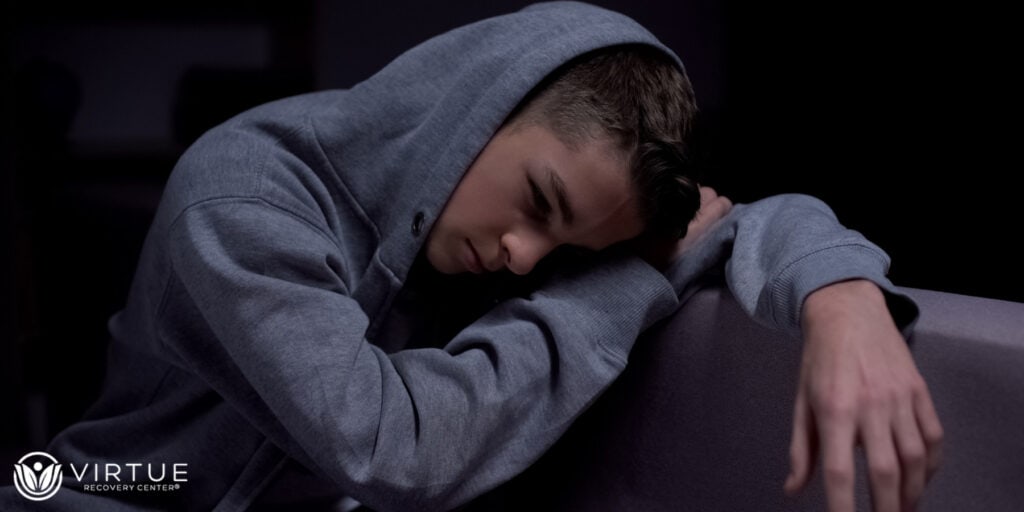
Table of Contents
Key Takeaways
- If not dealt with early, teens who smoke cigarettes or use marijuana may be at risk for long-term mental and physical health problems.
- Parents can find relief in knowing that a professional detox program provides their teens with supervised care, ensuring a safe and controlled environment to help them stop using drugs like nicotine and THC.
- The comprehensive programs often include behavioral therapy, family support, and treatment for eating disorders, providing a holistic approach to healing and instilling confidence in parents about the care their teens will receive.
- Long-term success is not just a possibility, but a reality with personalized care, education, and plans to prevent relapse, giving parents hope and optimism about their teen’s future.
Introduction
Teenagers who smoke pot and use vapes don’t always know how quickly these drugs can hurt their bodies and minds. People often don’t realize how harmful the effects can be, like anxiety attacks, memory problems, compulsive eating, and addiction. As more teens in Arizona use drugs, early intervention programs like the detox program in Chandler have become very important.
Medical detox gives teens a safe and controlled place to start their recovery while also dealing with underlying problems like compulsive overeating or mood swings. Many teens have a hard time getting involved in long-term therapy or behavioral treatment without this crucial first step.
Why Is Detox Important For Teens Who Smoke Marijuana And Vape?

People often think that vaping and cannabis are less harmful, but they can do a lot of damage to the brain while it is still growing in teens. Nicotine and THC change how the brain works in areas that control attention, learning, and impulse control. Teens may show signs of irritability and mood swings when they use drugs too much.
- Lower grades in school
- Disruption of sleep
- Withdrawing from social situations
Detox allows for physical stabilization and clears the mind for therapeutic work. According to the Centers for Disease Control and Prevention, adolescent marijuana use is linked to long-term problems with memory and learning (CDC, 2024).
What Goes On In A Chandler Teen Detox Program?
Detox programs start with an assessment to find out how much drugs or alcohol a person is using and if they have any other problems, like anxiety or eating disorders. The goal is to help teens, in particular, get stable both physically and emotionally. Most detox programs have:
- Medical monitoring all the time
- Nutritional help, especially for people who overeat or have eating disorders
- Counseling to deal with the emotional effects of withdrawal
- Take medicine if you need it to control your cravings or anxiety
In Chandler, specialized facilities work closely with families to ensure that the detox process is tailored to the person’s age and takes into account any past trauma. The Substance Abuse and Mental Health Services Administration (SAMHSA) notes that tailored approaches are vital in adolescent detox and treatment (SAMHSA, 2023).
How Are Eating Disorders And Drug Use Related In Teens?

Teenagers who have eating disorders are very likely also to use drugs. For example, vaping has been linked to a loss of appetite, while marijuana can make people binge eat and create mental health disorders. Many teens who are having emotional problems use both food and drugs to make themselves feel better.
Many treatment centers in Chandler combine substance detox with eating disorder treatment. Dealing with compulsive behaviors on many levels leads to more profound healing and better results.
How Do Programs Help People With Mental Health Issues Like Anxiety Or Trauma?
Teenagers who use drugs often also have mental health problems like anxiety or trauma. You need more than just a detox program; you need full care. Programs usually offer more than just detox, such as:
- Cognitive Behavioral Therapy, or CBT
- Counseling for families
- Care that takes trauma into account
- Sessions of group therapy
These approaches enable teens to explore the root causes of substance use and develop coping strategies. The U.S. National Library of Medicine provides insight into the risks of vaping and e-hookahs (MedlinePlus, 2023).
What Should You Do After Detox?
Detox is the first step on the road to recovery. After the teens are medically stable, they transition to structured treatment programs. Some of these are:
- Programs for people who live at home or go to the hospital
- Help with schoolwork
- Therapy that goes on
- Plans for integrating families
Long-term success depends on receiving regular support, making lifestyle adjustments, and attending therapy and education that focus on recovery and ongoing support. Many centers offer integrated care after detox to help with specific mental health and behavioral issues. This can include nutritional advice, stress-reduction strategies, and methods to prevent relapse.
Conclusion
Teen vaping and marijuana use are on the rise, so early intervention through a professional detox program in Chandler is more critical than ever. Detox makes recovery possible by stabilizing the body and getting teens ready for complete treatment. It gives a whole and caring way to get better when combined with eating disorder and mental health services.
Are you worried about your teen smoking or using marijuana? To speak with our caring staff, call Virtue Recovery Center at 866-461-3339. We can help your family take the first step toward getting better.
FAQs
Do Teens Who Only Use Marijuana Or Vapes Need To Detox?
Yes, detox can help with dependency, mood swings, and withdrawal symptoms, even from drugs that are usually thought to be mild.
Can Detox Help With Eating Problems Like Overeating?
Yes. Many detox programs include nutritional help and therapy for problems related to eating.
How Long Does A Teen Detox Usually Last?
Teen detox programs usually last between 5 and 10 days, depending on how much drugs or alcohol the teen has used in the past and any other problems they may have.
What Happens After You Stop Using Drugs?
Teens often go to outpatient or residential treatment programs that focus on therapy, school, and family involvement.
Do Parents Help Out During Detox?
Yes. Family involvement is encouraged and often necessary for long-term recovery success.
Resource Links:
- Centers for Disease Control and Prevention. “Cannabis and Teens.” CDC, 2024, https://www.cdc.gov/cannabis/health-effects/cannabis-and-teens.html
- Substance Abuse and Mental Health Services Administration. “Principles of Adolescent Substance Use Disorder Treatment: A Research‑Based Guide.” SAMHSA, 2023, https://www.samhsa.gov/resource/ebp/principles-adolescent-substance-use-disorder-treatment-research-based-guide
- MedlinePlus. “E‑Cigarettes and E‑Hookahs.” U.S. National Library of Medicine, 2023, https://medlineplus.gov/ecigarettes.html
Are You Covered For Treatment?
At Virtue Recovery Center, we understand the importance of accessible care. That’s why we’re in-network with numerous private insurance companies, ensuring that your journey to recovery is supported from the start. Let us help you quickly and easily verify your insurance coverage. Begin your path to healing today.
- About the Author
- Latest Posts
Gigi Price( Clinical Director )
Gigi Price holds licenses as a Master Social Worker and Clinical Drug Counselor. She completed her master’s degree in Social Work at Texas State University. Over the last decade, Gigi has been dedicated to utilizing evidence-based practices to enhance patient care and treatment planning, resulting in positive, long-term outcomes for patients and their families. Her passion lies in creating a treatment environment where professionals collaborate to bring about positive change and provide a safe, trustworthy therapeutic experience. Patients can be confident in receiving top-quality care under her leadership.
In her role as the Clinical Director of Virtue Recovery Houston, Gigi conducted research to identify the most effective approaches for treating patients with acute mental health diagnoses, PTSD, and Substance Use Disorder. She then assembled a team of skilled clinicians who could offer various therapeutic modalities, such as Cognitive Behavioral Therapy (CBT), Dialectical Behavioral Therapy (DBT), Acceptance and Commitment Therapy (ACT), Somatic Exposure, Eye Movement Desensitization and Reprocessing (EMDR), and Cognitive Processing Therapy (CPT). Gigi takes pride in overseeing the development and implementation of Virtue Houston’s Treatment Program, which includes two specialized therapeutic curricula tailored to the unique needs of individuals struggling with mental health issues, addiction, and PTSD.
How Cognitive Behavioral Therapy Supports Lasting Sobriety After Cocaine Addiction …
How an Eating Disorder Program Helps Manage Binge-Eating Episodes Key …
Key Takeaways Regular exercise reduces cravings and withdrawal symptoms. Physical …
Key Takeaways Veterans Day began as Armistice Day in 1918 …
Key Takeaways Proper nutrition plays a vital role in addiction …
Key Takeaways Long-term sobriety is achievable with evidence-based addiction treatment …


























